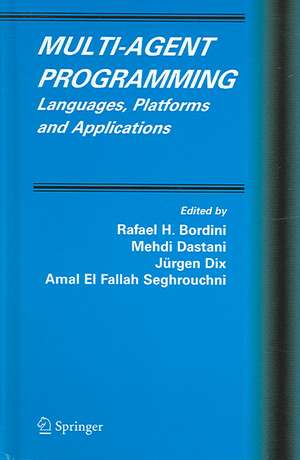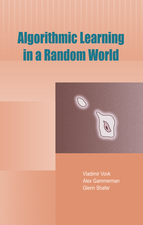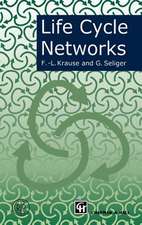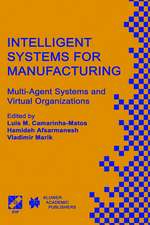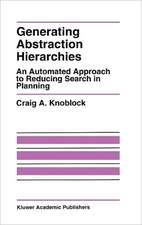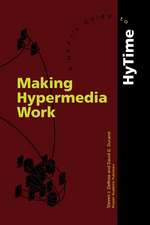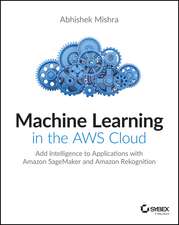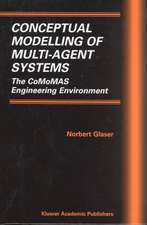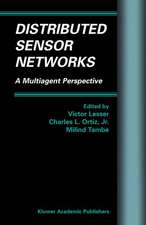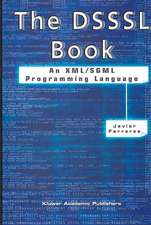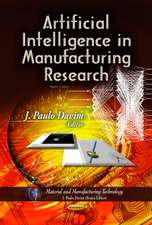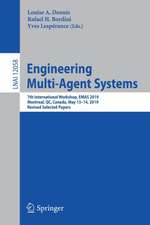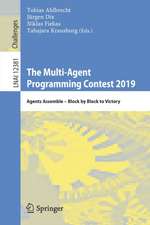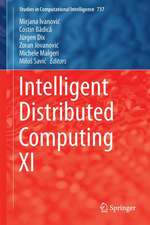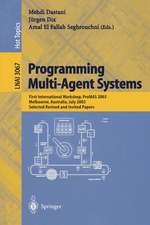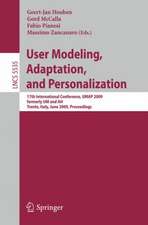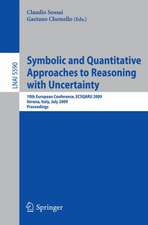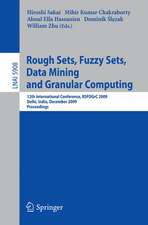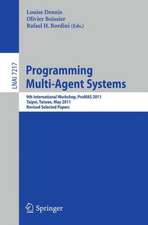Multi-Agent Programming: Languages, Platforms and Applications: Multiagent Systems, Artificial Societies, and Simulated Organizations, cartea 15
Editat de Rafael H. Bordini, Mehdi Dastani, Jürgen Dix, Amal El Fallah Seghrouchnien Limba Engleză Hardback – 29 iul 2005
Part I describes approaches that rely on computational logic or process algebra – Jason, 3APL, IMPACT, and CLAIM/SyMPA. Part II presents languages and platforms that extend or are based on Java – JADE, Jadex and JACKTM. Part III provides two significant industry specific applications – The DEFACTO System for coordinating human-agent teams for disaster response, and the ARTIMIS rational dialogue agent technology. Also featured are seven appendices for quick reference and comparison.
| Toate formatele și edițiile | Preț | Express |
|---|---|---|
| Paperback (2) | 708.48 lei 6-8 săpt. | |
| Springer Us – 30 noi 2014 | 708.48 lei 6-8 săpt. | |
| Springer Us – 8 dec 2010 | 988.81 lei 6-8 săpt. | |
| Hardback (2) | 995.09 lei 6-8 săpt. | |
| Springer Us – 29 iul 2005 | 995.09 lei 6-8 săpt. | |
| Springer Us – 23 iun 2009 | 999.53 lei 6-8 săpt. |
Preț: 995.09 lei
Preț vechi: 1243.86 lei
-20% Nou
Puncte Express: 1493
Preț estimativ în valută:
190.42€ • 203.61$ • 158.76£
190.42€ • 203.61$ • 158.76£
Carte tipărită la comandă
Livrare economică 18 aprilie-02 mai
Preluare comenzi: 021 569.72.76
Specificații
ISBN-13: 9780387245683
ISBN-10: 0387245685
Pagini: 296
Ilustrații: XXXIV, 296 p.
Dimensiuni: 155 x 235 x 19 mm
Greutate: 0.64 kg
Ediția:2005
Editura: Springer Us
Colecția Springer
Seria Multiagent Systems, Artificial Societies, and Simulated Organizations
Locul publicării:New York, NY, United States
ISBN-10: 0387245685
Pagini: 296
Ilustrații: XXXIV, 296 p.
Dimensiuni: 155 x 235 x 19 mm
Greutate: 0.64 kg
Ediția:2005
Editura: Springer Us
Colecția Springer
Seria Multiagent Systems, Artificial Societies, and Simulated Organizations
Locul publicării:New York, NY, United States
Public țintă
Professional/practitionerCuprins
Logic- or Process Algebra-Based Agent Programming Languages.- Jason and the Golden Fleece of Agent-Oriented Programming.- Programming Multi-Agent Systems in 3APL.- Impact: A Multi-Agent Framework with Declarative Semantics.- Claim and Sympa: A Programming Environment for Intelligent and Mobile Agents.- Java-Based Agent Programming Languages.- Jade — A Java Agent Development Framework.- Jadex: A BDI Reasoning Engine.- Jack™ Intelligent Agents: An Industrial Strength Platform.- Industrial-Strength Applications.- The Defacto System: Coordinating Human-Agent Teams for the Future of Disaster Response.- Artimis Rational Dialogue Agent Technology: An Overview.
Recenzii
From the reviews:
"This is the second book in a series … that aims to provide an overview of the state of the art in multi-agent systems programming … . The way the book is organized makes it possible for readers who are seeking advice for selecting an agent development framework to obtain an overview of several possible choices … for their needs. Also, readers who are interested in gaining insight into one particular language will find many interesting details in the respective chapter." (Angelica de Antonio, ACM Computing Reviews, November, 2009)
"This is the second book in a series … that aims to provide an overview of the state of the art in multi-agent systems programming … . The way the book is organized makes it possible for readers who are seeking advice for selecting an agent development framework to obtain an overview of several possible choices … for their needs. Also, readers who are interested in gaining insight into one particular language will find many interesting details in the respective chapter." (Angelica de Antonio, ACM Computing Reviews, November, 2009)
Textul de pe ultima copertă
Multi-Agent Programming is an essential reference for anyone interested in the most up-to-date developments in MAS programming. Programmers, researchers, and graduate students will find this text unique in its presentation of the concepts and principles of this fast-growing field. While previous research has focused on the development of formal and informal approaches to analyse and specify Multi-Agent Systems, this book focuses on the development of programming languages and tools which not only support MAS programming, but also implement key concepts of MAS in unified frameworks.
Part I describes four approaches that are based on computational logic or process algebra--Jason, 3APL, IMPACT, and CLAIM/SyMPA. These programming languages have formal semantics and use heavy machinery based on formal methods, but also provide working platforms for the development of multi-agent systems.
Part II presents agent languages and platforms that extend or are based on Java--JADE, Jadex, and JACKTM. Although these have no formal semantics, the languages are well documented and the platforms provide a variety of tools that have been extensively used in practice.
Part III provides two significant industry specific applications--The DEFACTO System for coordinating human-agent teams for the future of disaster response, and the ARTIMIS rational dialogue agent technology.
The book also features seven appendices, summarising each of the agent programming languages, hence facilitating comparison of the approaches. In particular, Appendix A describes the criteria used for comparing the agent languages and platforms.
Part I describes four approaches that are based on computational logic or process algebra--Jason, 3APL, IMPACT, and CLAIM/SyMPA. These programming languages have formal semantics and use heavy machinery based on formal methods, but also provide working platforms for the development of multi-agent systems.
Part II presents agent languages and platforms that extend or are based on Java--JADE, Jadex, and JACKTM. Although these have no formal semantics, the languages are well documented and the platforms provide a variety of tools that have been extensively used in practice.
Part III provides two significant industry specific applications--The DEFACTO System for coordinating human-agent teams for the future of disaster response, and the ARTIMIS rational dialogue agent technology.
The book also features seven appendices, summarising each of the agent programming languages, hence facilitating comparison of the approaches. In particular, Appendix A describes the criteria used for comparing the agent languages and platforms.
Caracteristici
Presents state-of-the-art concepts, properties, requirements, and principles that are essential for future Multi-Agent Systems programming technology Unique focus on development of programming languages and tools that support MAS programming while also implementing key concepts of MAS in a unified framework Includes seven appendices for summary and comparison of the languages Includes supplementary material: sn.pub/extras
